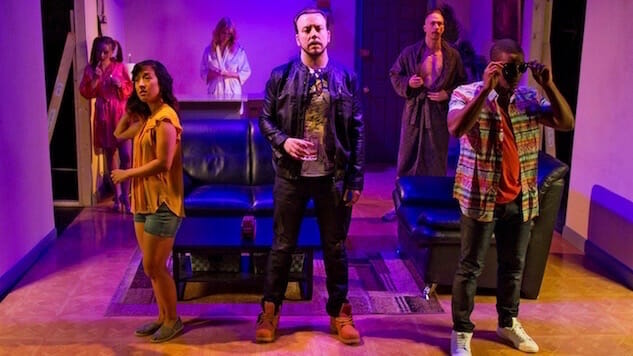Paul Cameron Hardy on Writing Mope
Jody Christopherson
Since the Internet was invented, online porn has been the elephant in the room. Most people feel awkward talking about it, but Paul Cameron Hardy’s play about the porn industry pulls no punches. Mope follows crass and hyper-masculine Trevor, who is on the lowest level of the porn totem pole, and the struggles he faces after years of equating himself to an appendage. Paste talked with Hardy about writing his thought-provoking show. Mope is showing at the Ensemble Studio Theatre until February 19.
Paste: When did you get the idea for Mope
Paul Cameron Hardy: The simple answer is in the spring of 2014, I started it and finished the first draft in fall of 2014. It was the first play I finished at Brooklyn College. I’ve had designs on writing a play about contemporary American straight pornography since I was around 20. I struggled for years and years figuring what story to tell. Some years ago, I realized I wanted to break it up and I think by the end there will be five or six plays in what I falsely call a cycle. It will share different characters and different places. Mope is the first in that series that I wrote.
Paste: After this are you planning on putting the second part of the series on anywhere?
Paul Cameron Hardy: I finished another one, and there was a reading of that a bit ago. I’m getting ramped up to write the third. I actually don’t want to spend all of my time writing pornography plays. I’m fairly conscience of not wanting to become the “porn play dude,” because a lot of people have super adverse reactions to the idea of porn plays or think they know what that means. I think a lot of what we hear about pornography either is really dissociative or negative about it or “Oh, look, porn!” and it’s about this very simplistic, titillation. It’s a very taboo subject matter, and I’m interested the bigger, stranger societal question of what it means to be in the subculture of making it. When I split it up, it’s great, because I can have these plays that are less—Mope is set in the porn world and I think you learn a lot of details that are not common knowledge, but Mope’s also not totally a play about porn. I don’t know when the second one will happen, but the goal is that this becomes so massively successful that I can have all six happening at once. In the way that Lucy Thurber did. I think it would super cool to experience them all together to see how the worlds fit into themselves and bleed into each other. But I’m very aggressively trying not to be the porn guy.
-

-

-

-

-

-

-

-

-

-

-

-

-

-

-

-

-

-

-

-

-

-

-

-

-

-

-

-

-

-

-

-

-

-

-

-

-

-

-

-








































